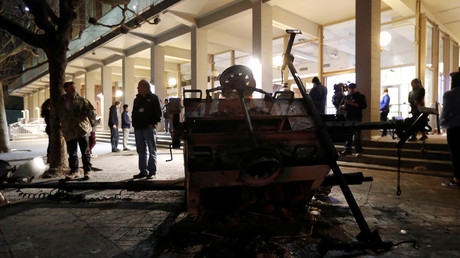53% of US undergrads afraid to disagree with outspoken professors on political, social issues — poll
US college campuses have traditionally been known as havens of free speech among students, but now professors are increasingly sharing their opinions — and many undergraduates are afraid to disagree with them, a new survey found.
Some 800 full-time undergraduate students at private and public four-year universities took part in the survey earlier this month that was conducted by McLaughlin & Associates on behalf of Yale University's William F. Buckley, Jr. Program.
More than half of those students (52 percent) said that their professors or course instructors express their own unrelated social or political beliefs "often" in class, according to the poll results that are due to be released next week, but were seen in advance by The Wall Street Journal found.
But unlike their professors, the young people find it more difficult to speak up. The survey found that 53 percent of the students polled often feel "intimidated" in sharing their ideas, opinions, or beliefs if they differ from their professor's. That's an increase of four percentage points from three years ago.
The students were also asked about hate speech on campuses, with 33 percent believing that physical violence can be justified to stop a person from making hateful or racially charged comments. That number represents a slight increase from last year, when 30 percent of students said the same.
Meanwhile, when asked about the First Amendment, which protects free speech in America, 17 percent of students said they would stand behind a rewrite of it, as they consider it "outdated."
While the poll doesn't specify which direction each professor's personal opinions lean, a survey conducted earlier this month by a politics professor at Sarah Lawrence College provides insight on the political affiliations of student affairs administrators in the US. A whopping 71 percent identified as liberal or very liberal, while only six percent identified as conservative to some degree.
"To students who are in their first semester at school, I urge you not to accept unthinkingly what your campus administrators are telling you. Their ideological imbalance, coupled with their agenda-setting power, threatens the free and open exchange of ideas, which is precisely what we need to protect in higher education in these politically polarized times," the study's author, Samuel J. Abrams, warned in a column in The New York Times.
Freedom of speech on America's college campuses has, according to many conservatives, long been under threat. The University of California at Berkeley has constantly found itself at the heart of the controversy.
The Berkeley campus, historically and currently known for its liberal students and staff, was at the center of clashes and arrests last year as protesters and counter-protesters came out in full force to make their voices heard over a talk by the former editor of conservative online news site Breitbart.
Berkeley also came under fire for canceling a planned speech by conservative pundit Ann Coulter last year, with some students even filing a lawsuit over the matter.
The behavior of the university, which is ironically the home of the Free Speech Movement, even evoked a response from US President Donald Trump, who threatened to pull its federal funding if it didn't change its tune.
But Berkeley isn't the only campus to make headlines for its treatment of conservative speakers. Texas Southern University in Houston canceled a commencement address by Republican Senator John Cornyn last year, after a petition was filed against his appearance by students.


No comments:
Post a Comment